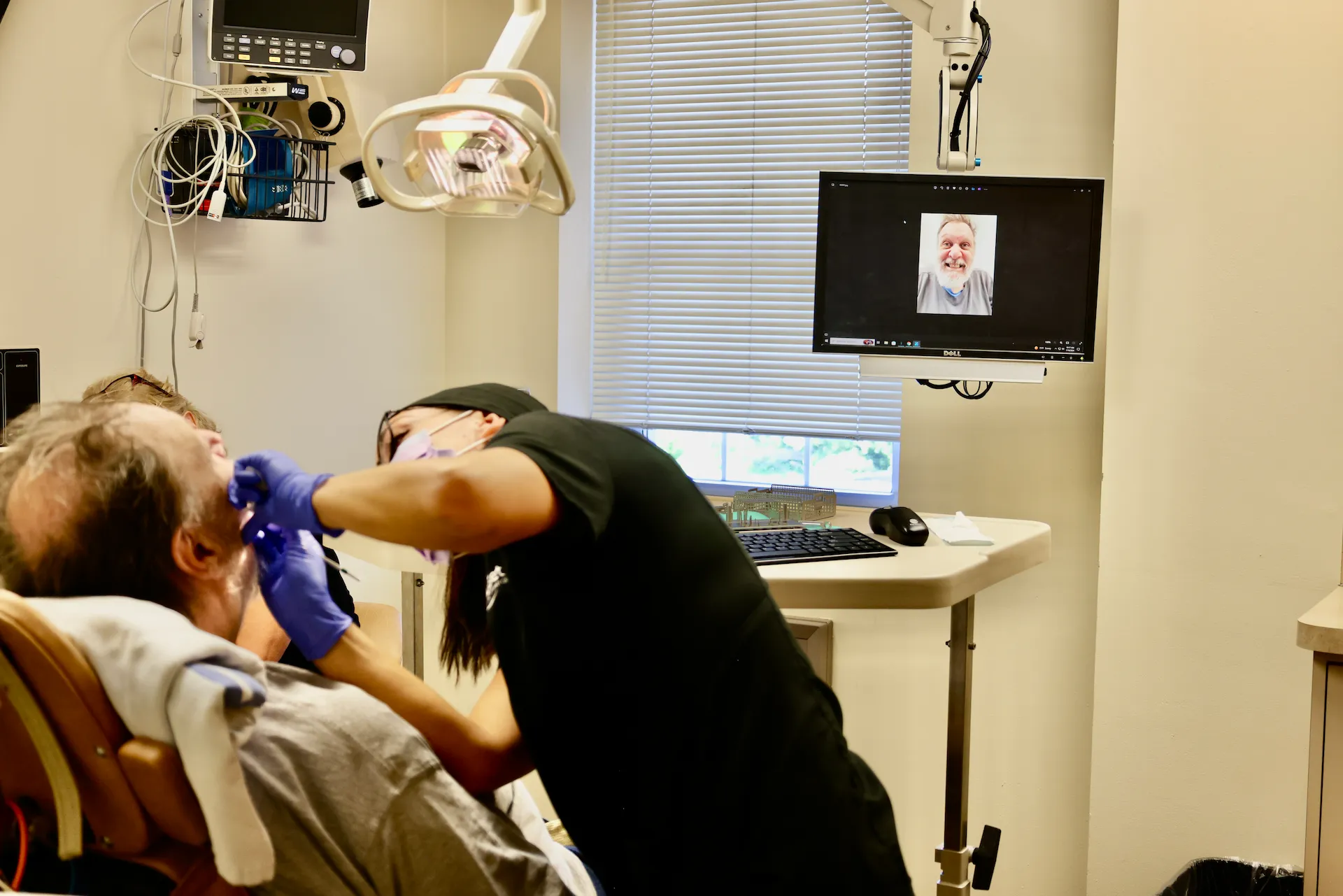The denture implant process involves several steps, each of which requires time to heal. Once the implants have healed and are fully assembled, the permanent dentures can be securely attached. The implant consists of three main parts: the implant body, the abutment, and the dentures.
The implant body is a small, screw-like piece that fuses with the jawbone, acting as a tooth’s root. The abutment connects to the implant body and extends above the gums. Dentures, which look like natural teeth, are placed on the abutment, providing a natural appearance.
Let’s discuss the denture implant procedure in detail!
What are Denture Implants?
Denture implants, also known as snap-in dentures, are a type of dental restoration supported by implants. These implants are small, screw-like posts made of titanium or ceramic that are surgically placed into your jawbone. The dentures snap onto these implants, providing a stable and secure fit.
Unlike traditional dentures that can slip and move, denture implants stay firmly in place. This stability helps you eat, speak, and smile more confidently, making them a popular choice for tooth replacement.
Difference Between Dental Implants and Denture Implants
Dental implants are individual new teeth attached directly to the jawbone. They replace single or multiple missing teeth and act as individual tooth roots.
Denture implants, on the other hand, are dentures supported by multiple implants. These implants anchor the dentures in place, making them more stable than traditional dentures.
While dental implants can replace individual teeth or a full set of teeth without needing to be removed, denture implants secure a full or partial denture, preventing it from slipping and providing a more secure fit. Denture implants, however, still need to be removed at night but both options improve chewing and speaking compared to traditional dentures.
Who is a Candidate for Denture Implants?
Almost everyone can be a candidate for denture implants. They are suitable for individuals who have lost multiple teeth and are looking for a more stable alternative to traditional dentures. Even if you have some bone loss in your jaw, you may still be eligible.
At NuSet Dental Implants and Oral Surgery, we provide personalized evaluations to determine if denture implants are right for you. Some people may need additional treatments, such as bone grafting, to ensure the implants have a strong foundation.
We will also need to evaluate if you have health conditions, such as uncontrolled diabetes or heart disease. Smoking can also affect the success of implants, so discussing these factors with us is crucial. Our team will guide you through each step, ensuring the best possible outcome for your dental health.
What is the Denture Implants Procedure at NuSet?
The denture implant procedure at NuSet involves several key stages to ensure a successful outcome. Here’s what to expect before, during, and after your denture implant procedure:
Initial consultation
Our dental team evaluates your oral health, takes X-rays, and discusses your treatment options. This helps create a personalized plan tailored to your needs.
Implant placement
Our dentist surgically places the implant bodies into your jawbone. This procedure is done under IV sedation to make you feel comfortable, and the procedure only takes a few hours. The implants act as roots for your new dentures.
Abutment attachment
Our dental team attaches abutments to the implant bodies. These abutments extend above the gumline and serve as connectors for your dentures.
Healing period
After the implants are placed, your jawbone needs time to fuse with them. This process, called osseointegration, takes 3-6 months. During this healing period, you may wear temporary dentures.
Denture placement
The final step involves snapping custom-made dentures onto the abutments. Our dentist ensures the dentures fit securely and comfortably, providing a natural appearance and feel.
Our dental team will provide detailed instructions and support throughout the process. Proper care and follow-up appointments are very important for the success of your denture implants. We guide you on how to maintain your implants and schedule regular checkups to monitor your progress.
Benefits of Denture Implants
Denture implants offer several advantages over traditional dentures:
Denture implants are stable
Denture implants are securely anchored to your jawbone, preventing the slipping and movement that often occur with traditional dentures. This stability allows you to eat and speak more confidently.
They are comfortable
Because denture implants are fixed in place, they feel more like natural teeth and reduce the discomfort and irritation sometimes caused by traditional dentures rubbing against the gums.
Denture implants help to improve oral health
Implants help preserve your jawbone and prevent bone loss that can occur with missing teeth. This preservation maintains the structure of your face and supports overall oral health.
You get value for money spent
While the initial cost of denture implants may be higher than traditional dentures, they often last longer and require fewer adjustments and replacements, resulting in cost savings over time.
With denture implants, your quality of life improves
With denture implants, you can enjoy a more varied diet, speak clearly, and smile confidently, improving your overall quality of life.
Choosing denture implants means opting for a more secure, comfortable, and lasting solution for missing teeth, offering both immediate and long-term benefits.
Are There Any Potential Risks or Complications?
While denture implants are generally safe, there are some potential risks and complications to be aware of. These risks include:
Infection
As with any surgical procedure, there is a risk of infection at the implant site. Proper oral hygiene and following post-surgery care instructions can minimize this risk.
Implant failure
In some cases, the implant may not fuse properly with the jawbone, leading to failure. Factors such as insufficient bone density or smoking can increase this risk.
Discomfort or pain
Some discomfort or pain after the procedure is normal, but it usually subsides within a few days. If the pain persists, please report it to our dental team.
To minimize risks, it is essential to follow our dentist’s instructions, maintain good oral hygiene, and attend all follow-up appointments. Our team at NuSet is dedicated to ensuring your safety and comfort throughout the denture implant process.
Recovery and Aftercare
Proper recovery and aftercare are crucial for the success of your denture implants. After the procedure, stick to soft foods and avoid chewing on hard or sticky foods to protect the implants and promote healing.
Maintain good oral hygiene by brushing twice a day and flossing regularly. Use a soft-bristled toothbrush to clean around the implants gently.
Attend all follow-up appointments with our dental team. These visits allow us to monitor your healing progress and address any concerns.
Some swelling and discomfort are normal after the procedure. To manage any pain, use over-the-counter pain relievers as directed by our dentist.
Adhere to all post-surgery care instructions provided by our dental team to minimize risks and ensure successful healing.
By following these recovery and aftercare tips, you can help ensure the long-term success and comfort of your denture implants.
Secure Your Smile with Denture Implants at NuSet!
Denture implants provide a stable, comfortable, long-lasting solution for missing teeth. They offer significant benefits over traditional dentures, including improved stability, comfort, and oral health. By choosing denture implants, you can enhance your quality of life, enjoy a more varied diet, and speak with confidence.
To determine if denture implants are the right choice for you, consult with our experienced dental team at NuSet Dental Implants and Oral Surgery. We provide personalized evaluations and comprehensive care to ensure the best outcomes.
Contact us now to learn more about how denture implants can improve your smile and oral health.
Frequently Asked Questions
What is the process for denture implants?
The process involves several stages: initial consultation, implant placement, healing period, abutment attachment, and denture placement. Our dental team evaluates your oral health, places the implants, allows time for healing, attaches the abutments, and finally fits the custom dentures securely onto the implants.
Is the denture implant procedure painful?
No, the denture implant procedure is not painful. It is done under IV sedation, so you should not feel pain during the surgery. Some discomfort and swelling are normal afterward, but pain can be managed with over-the-counter pain relievers and following our dentist’s care instructions.
How long do implant dentures take to heal?
Healing usually takes 3-6 months. The implants need time to fuse with the jawbone in osseointegration. During this period, you may wear temporary dentures.
How long is the dental implant procedure?
The initial surgery to place the implants takes a few hours. The entire process, including healing and follow-up appointments, typically spans 3-8 to ensure proper integration and fitting of the dentures.





